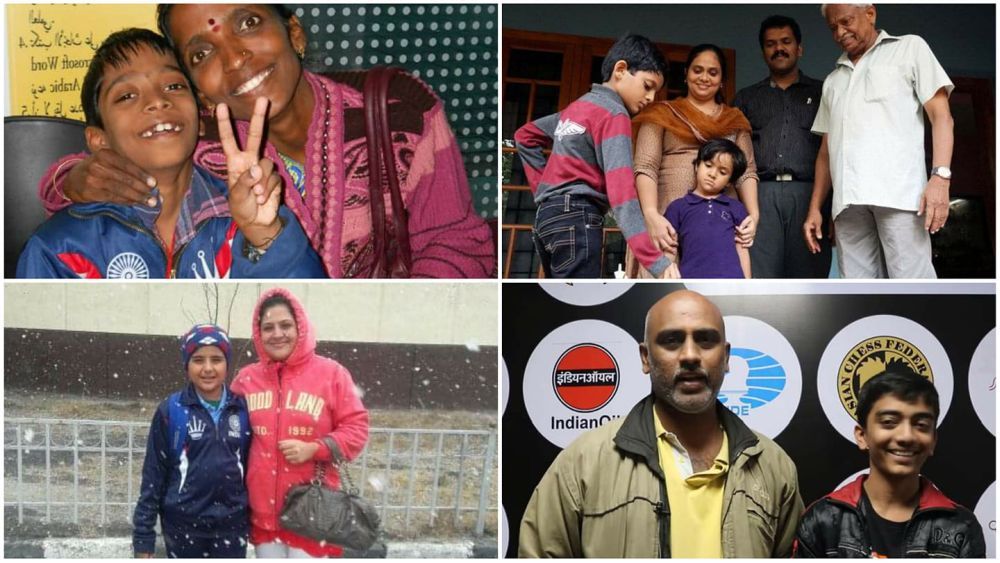Being a Chess Parent - Part I
We regularly come across many articles, books, annotations on ChessBase India directed to improve the game of chess players, however there is one more factor of vital importance in the life of every chess aspirant that crucially determines how far they will go in the world of chess: the role of their parents. If you are a chess player, thank you very much for your time and interest in this article, you can skip and go back to your chess practice. If you are not a chess player and a nonprofessional like me whose child happens to show interest in chess, and if you are wondering whether you are guiding the child in the right direction, then this article might answer some of your queries.
Some Rudimentary Advice to Aspiring Chess Parents
There are so many questions we have in our minds when our children start showing an interest in chess. As parents we are inclined to feel that our children are playing tremendous chess, also we have every right to hope that fine-tuning certain areas of their game will help them achieve success in their respective age categories. However, as chess parents, how can we guide our children to achieve their specific chess goals? What actions do we need to take to make sure that in the long run they do not lose their interest in the game? These are some of the critical questions that puzzles each one of us from time to time and indeed, only very few succeed to answer them; most of us falter and, more often than not, the reason is a lack of proper direction or lack of patience. We do not have enough knowledge about the game and often we do not give ourselves and our children enough time to succeed.

I am a chess parent and I started teaching chess to my child when he was just four years old, he learned the name of the pieces and the moves quickly and started to play real games within a month. As a father I was pleasantly surprised and already started to imagine him as a future chess champion. However, I was not a chess player myself, I didn't know anything about tournaments, and therefore I had to do a lot of research in order to be able to guide my child. After teaching him and playing chess with him for 6 months, I thought I would enroll him in an academy and see his progress. As parents you will have ambitions, you will want your children to start participating and excel in tournaments, but is this at all a good idea? Well, you would need to know about the tournaments in order to determine whether enrolling your children to a particular tournament is a good idea. You would do well by first looking at the different age categories, usually they start from under seven or under eight. A child who is born on or after 1st January 2013 can participate in the under seven category till 31st December 2020, and the same child can participate in the under eight till 31st December 2021. Nowadays parents are encouraging their children to start a year earlier so that they have a year's worth of more experience competing in these age-category events. The next thing to be seen is whether it is a district level, a state level, or an open tournament. The competition will vary accordingly. For District level events registration under the relevant District Chess Association is compulsory, for state level tournaments registration under State Chess Association is compulsory, and for state championships and national tournaments, AICF (All India Chess federation) registration is compulsory. But now the important question is whether a child can participate in any tournament of their choice. The answer in short is yes. For district and state level tournaments you can participate with a normal entry fee as prescribed. For state championships, you need to be one of the top finishers in district level to be able to participate with the normal entry fee (usually INR 400). If you were not able to finish at the top in the district level, even then you can play the state championships but you have to pay a special entry fee, which is usually double the normal entry fee. Of course, for state championships and other state tournaments and national level tournaments you might have to travel with your child and stay at the venue or nearby for a period of three to four days. How to know about various upcoming tournaments? Well, there are several websites available for this purpose (For example, easypaychess.com, chessfee.com, paychessentry.com etc) that will furnish you with all the information about various tournaments in the city and the state and also enable online payment of entry fees at the same time.
Initially children usually look to end their games fast. They frequently fail to consider their opponent's moves and tactical resources and lose prematurely. But this gradually changes with experience. So a child with more experience of playing tournaments will generally do much better than a child who has just started the journey. The important thing to keep in mind with regards to this is to give them enough space and creative freedom, their academy and growing experience will surely make them play better in the future but only time will answer when. Also, encourage your child to participate in rapid tournaments with time control of 30 mins or so rather than blitz tournaments, the child has to first learn and then they can build themselves to play fast later.
Now is it right to compare the child with others who have finished at the top at such an early age? Dear parent, please think what you were doing at six years of age. These children are facing an “opponent” that too “one on one” without parents support and they are learning to adapt, all at such a tender age. These children are seeing the results of their hard work or passion within 30 mins and are building up the mentality to accept success and failure accordingly. Rest assured your child is unknowingly learning the ways of life and its difficulties. Be a proud parent that your child is playing chess and do not look for only results!

During an ongoing tournament, you will find all parents hooked onto their mobiles in the waiting hall. This might make you wonder what they are doing. Well, they spend their time looking at the results of their children “online”. After every round the child's score, standing and next round opponent are updated online in all recognized tournaments via chess-results.com.
Usually a tournament will have six to seven rounds and your child will be paired against a child of the same age category (unless it’s an open tournament). The child will be given white and black pieces alternatively in each round and will be paired according to their standings in the leaderboard. For example, a child with two wins out of five rounds will be paired with a child who has achieved the same 2 points out of 5 games, Children with the same points are placed in the standings according to buchholz method (which is something you will get a hang of after attending three or four tournaments). At the tournament, you will see many parents talking to children about chess, making them solve tactics, giving them mobile to play online games etc, most of the tournaments take place during weekends and you will see parents pacing up and down eagerly waiting for the results. I have myself seen many parents after a bad result. This is not right, give your child a year (or maybe even more) to excel and if the child doesn’t excel then be happy that chess has given life lessons to your child and move on. Being a good chess parent is a difficult task, you will tend to react, but you have to exercise restraint, you will have to sacrifice your weekends for tournaments and classes, much of your personal time will be lost. And after all this ordeal your child might not perform well in the tournament, this is where most chess players and parents lose patience. Well, success never comes easily. It requires lots of hard work and dedication on the part of the chess player and a lot of maturity on the part of their parents as well.
As a chess parent, enroll the child to a decent academy – don’t change academy every now and then, the child needs to be comfortable while playing chess and this can only be achieved if they are in one place for a particular length of time. Play with the child every day, solve puzzles, and read to the child articles related to chess and current trends. Over a period, the child will gradually show improvement, until that time, a chess parent needs to be patient.
My intention of writing this article is to help an aspiring chess parent to pursue and encourage their child to learn chess irrespective of the outcome. Please have in mind it’s always a win-win situation for a chess player, if not in chess the child will excel elsewhere. You might notice that I have not stated anything about ratings, well, that’s a separate topic to discuss in our next article.

